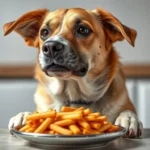
Introduction
Doberman puppies are known for their intelligence, loyalty, and athleticism. As a breed, they are both strong and graceful, making them excellent companions and working dogs. However, the early stages of their life are crucial for their long-term health and development. Proper nutrition is essential for these active little pups to ensure they grow into healthy adults.
As a new Doberman puppy owner or an enthusiast, understanding the best foods for Doberman puppies is vital. This article will guide you through the nutritional needs of your puppy, outline the best food options available, and provide essential feeding guidelines to help you raise a healthy, happy Doberman.
Understanding Doberman Puppy Nutritional Needs
Nutritional Requirements for Puppies
Puppies have unique nutritional needs to support their rapid growth and development. The key nutrients essential for puppy growth include:
- Proteins: Essential for muscle development and repair. Puppies require higher protein levels than adult dogs.
- Fats: Provide energy and promote healthy skin and coat. Essential fatty acids, such as omega-3 and omega-6, are crucial for cognitive development and joint health.
- Carbohydrates: Serve as a source of energy. They also support digestive health when sourced from whole grains and vegetables.
- Vitamins and Minerals: Vital for various bodily functions, including immune support, bone health, and overall growth.
A balanced diet during the growth phase ensures that Doberman puppies receive all the necessary nutrients to develop into strong and healthy adults.
Size and Growth Considerations
Doberman puppies are classified as a large breed, and their growth rate can be impressive. They typically reach their adult size between 18 to 24 months, and this rapid growth necessitates a diet rich in the nutrients mentioned above. The size and weight of a Doberman can impact their nutritional needs; therefore, it’s essential to adjust their diet accordingly.
Life Stage Nutrition
Puppy nutrition differs significantly from adult and senior dog nutrition. While all dogs require a balanced diet, Doberman puppies specifically need higher protein and fat levels to support their growth and energy requirements. Unlike other breeds that may have different growth patterns, Dobermans require a tailored diet that aligns with their unique physiological needs.
Best Food Options for Doberman Puppies
Commercial Dog Foods
When selecting the best foods for Doberman puppies, commercial dog foods are often the most convenient option. These can be categorized into three primary types:
- Kibble: Dry food that is easy to store and serves as a cost-effective option. Kibble is often fortified with vitamins and minerals.
- Wet Food: Canned food that can be more palatable for puppies. It often contains higher moisture content, which can be beneficial for hydration.
- Raw Diets: A raw or “BARF” diet includes uncooked meats, vegetables, and bones. While this can be nutritious, it requires careful preparation to avoid nutritional imbalances.
Pros and Cons of Each Type
| Food Type | Pros | Cons |
|---|---|---|
| Kibble | Convenient, cost-effective, long shelf life | May contain fillers, less palatable for picky eaters |
| Wet Food | More palatable, higher moisture content | More expensive, shorter shelf life |
| Raw Diets | Natural, high-quality ingredients | Requires preparation, risk of bacteria |
Top Recommended Brands for Doberman Puppies
Brand 1: Royal Canin
- Nutritional Breakdown: High-quality proteins, omega-3 fatty acids, and antioxidants.
- Key Features: Designed specifically for Doberman puppies, promoting healthy growth and development. The formula supports digestive health and is tailored to meet the unique needs of the breed.
Brand 2: Blue Buffalo Life Protection Formula
- Nutritional Breakdown: Real meat as the first ingredient, whole grains, and a blend of vitamins and minerals.
- Key Features: Includes LifeSource Bits—a precise blend of antioxidants, vitamins, and minerals. This brand prioritizes natural ingredients and avoids artificial preservatives.
Brand 3: Nutro Ultra Grain-Free Puppy Food
- Nutritional Breakdown: Chicken, lamb, and salmon provide high-quality protein, along with wholesome fruits and vegetables.
- Key Features: Grain-free recipe to help with potential sensitivities, supporting healthy skin and coat, and promoting overall wellness.
Homemade Diets
For some owners, preparing homemade meals can be a beneficial option. Homemade diets can be tailored to meet the specific needs of your Doberman puppy.
Benefits of Homemade Meals
- Quality Control: You have complete control over the ingredients, ensuring high quality and nutritional value.
- Customization: You can adjust the diet based on your puppy’s preferences and dietary needs.
Key Ingredients to Include
- Lean meats (chicken, turkey, beef)
- Vegetables (carrots, peas, spinach)
- Healthy fats (olive oil, fish oil)
- Whole grains (brown rice, quinoa)
Sample Recipe for Doberman Puppies
Chicken and Veggie Puppy Meal
- 1 cup cooked chicken (shredded)
- 1/2 cup cooked brown rice
- 1/4 cup steamed carrots
- 1 tablespoon olive oil
Mix all ingredients and serve warm. Ensure that the meal is balanced with protein, carbs, and healthy fats.
Supplements and Additives
In some cases, supplements can enhance your Doberman puppy’s diet. Omega fatty acids can support skin and coat health, while glucosamine may be beneficial for joint health, especially in larger breeds prone to hip dysplasia.
When to Consider Adding Supplements
If your puppy shows signs of allergies, has a dull coat, or experiences joint issues, it may be time to consult your veterinarian about the appropriate supplements to include in their diet.
Feeding Guidelines
Portion Control
Determining the right portion size for your Doberman puppy is essential for maintaining a healthy weight. Factors that affect portion sizes include age, weight, and activity level. Generally, puppies need to be fed multiple times a day to support their energy needs and encourage healthy growth.
Feeding Schedule
For Doberman puppies, a feeding frequency of three to four meals per day is recommended. As the puppy grows and transitions to adult food, you can gradually reduce the frequency to two meals a day.
Monitoring Health and Adjustments
It’s important to monitor your puppy’s weight, coat condition, and overall health. Signs of a well-nourished puppy include a shiny coat, bright eyes, and a healthy level of energy. If you notice any changes or concerns regarding diet, consult with your veterinarian.
Common Nutritional Issues in Doberman Puppies
Overfeeding and Obesity
Obesity can be a significant issue in Doberman puppies, leading to various health problems. Overfeeding can cause joint issues, heart disease, and diabetes.
Strategies to Prevent Overfeeding
- Measure food portions according to the packaging guidelines.
- Avoid giving too many treats and table scraps.
- Encourage regular exercise to maintain a healthy weight.
Allergies and Sensitivities
Doberman puppies may experience food allergies or sensitivities, which can manifest as skin issues or digestive problems. Common allergens include grains and certain proteins.
Identifying and Managing Dietary Sensitivities
If you suspect your puppy has food allergies, consult your veterinarian for a proper diagnosis. An elimination diet may be recommended to pinpoint specific allergens.
Digestive Problems
Puppies can experience various digestive issues, such as diarrhea or constipation. These problems can arise from sudden changes in diet, food intolerances, or infections.
Tips for Maintaining Gut Health
- Introduce new foods gradually to avoid digestive upset.
- Ensure your puppy stays hydrated.
- Provide a balanced diet rich in fiber to promote healthy digestion.
Tips for Transitioning Foods
Why Transitioning is Important
Transitioning your puppy to a new diet should be done gradually to avoid digestive upset. A sudden change can lead to diarrhea or vomiting, which can be distressing for both you and your puppy.
Steps for a Successful Transition
- Start by mixing a small amount of the new food with the current food.
- Gradually increase the proportion of the new food while decreasing the old food over a week.
- Monitor your puppy for any adverse reactions during the transition.
Conclusion
Proper nutrition is critical for the growth and development of Doberman puppies. By understanding their unique nutritional needs and selecting the best foods for Doberman puppies, you can help ensure a healthy start to their lives. Always prioritize a balanced diet and consult with your veterinarian for personalized feeding plans that will cater specifically to your puppy’s needs. With the right care and attention, your Doberman puppy will grow into a strong and loyal companion.









